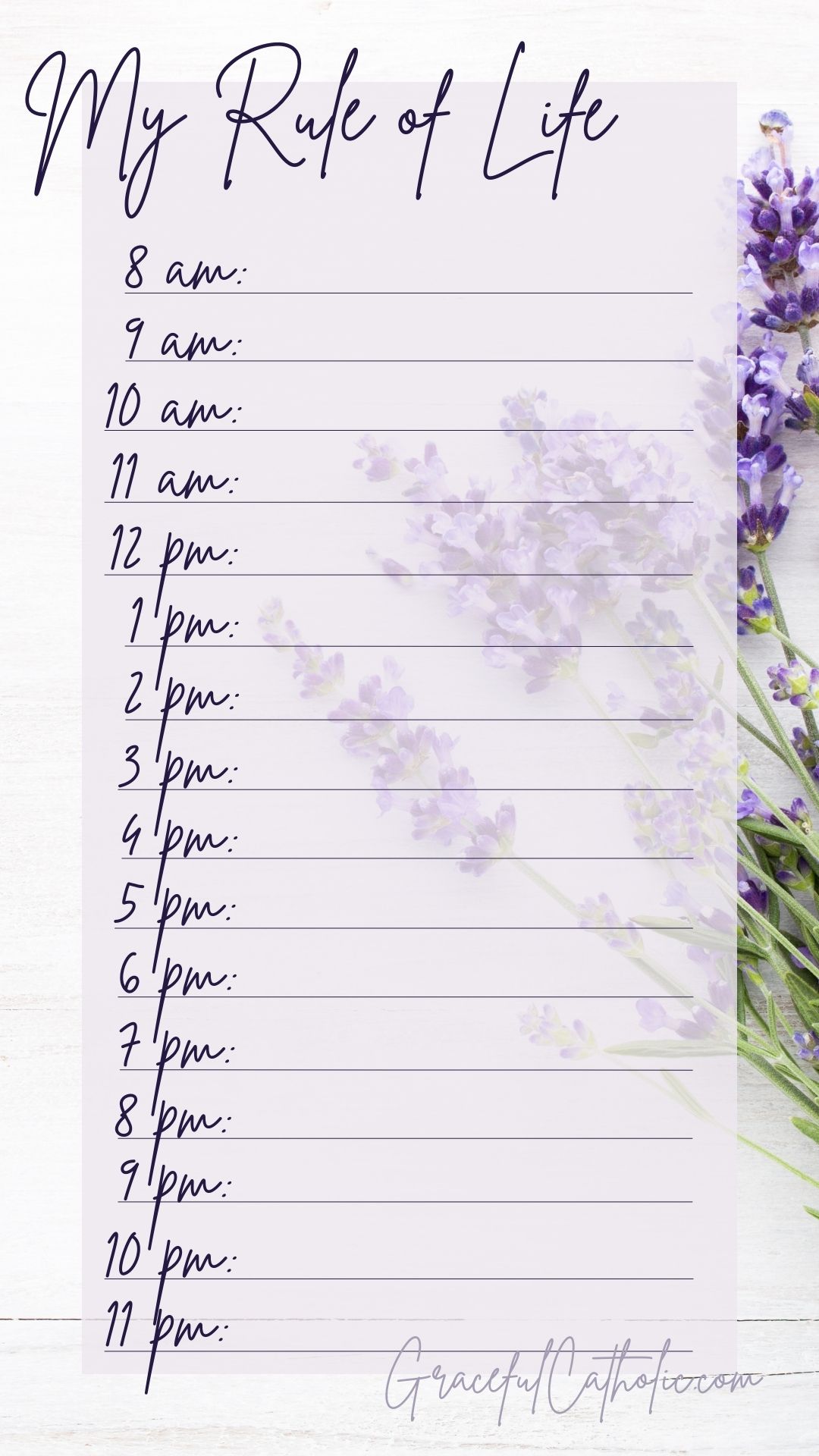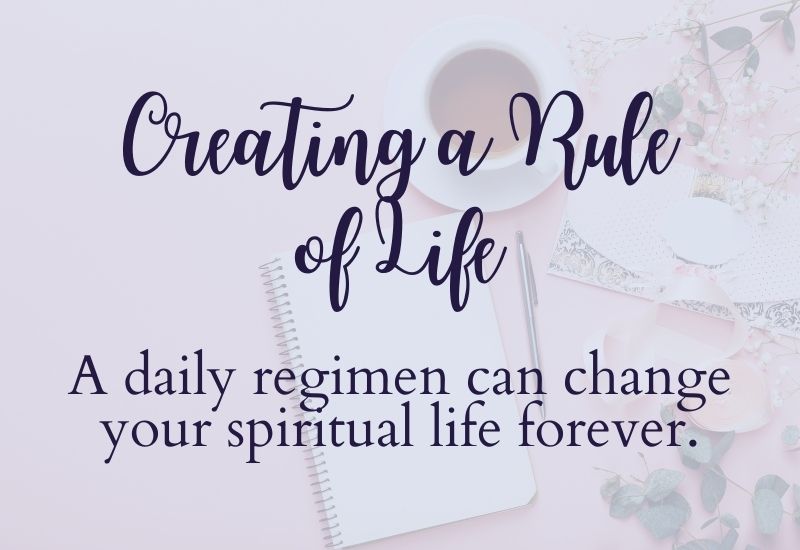Howdy folks! 👋🏼
Yesterday, I stumbled across one of my favorite priests on YouTube, Fr. Ripperger, discussing a topic that has greatly troubled and eluded me lately: creating and sticking to a routine.
Don’t get me wrong, I am a list-making person. I LOVE planning how I will use every hour of the day. I get positively giddy when I get to check to-dos off my list. (Don’t believe me? Just ask my husband who thinks I’m borderline crazy for my list writing love affair.)
You might think that my lists help me to stay super on top of everything and really organized. Aaaaand that’s where you’re wrong.
I write lists all the time, but I have a super hard time holding myself accountable to said scheduling and lists. I blame the Texas Department of Education and highly regimented school systems… or maybe the Russians. 🤐
After listening to Father Ripperger’s fantastic talk on the subject, however, I realized the true culprit to blame for my inconsistency problem was me.
(Dang.)
Some of the goals and to-dos I plan do get crossed off. I’m not a total self-disciplinary flop. But there are too many others plans that are lost to the cosmos never to be checked off and accomplished.
BUT this unhealthy cycle of feeding my own appetites ends today! In this post, I’m going to tell you all about Father Ripperger’s specific recipe for a great Catholic spiritual (and otherwise) life! We’re gonna get a daily schedule going that you have no choice but to follow (at least that’s the dream).
Procrastinating list writers of the world unite 🦸♀️ (to crush our bad habits and form new ones)!!
Why Create and Write Down Your Rule of Life?

So why, according to Father Ripperger, must we formulate and write down our Rule of Life and our daily regimen?
According to Aristotle, character (or Íthos) is produced by habit (ethos). Father Ripperger points out that when we form good habits of prayer, meditation, discipline, and fulfilling our duties in life, the moral life is way easier. [1]
As Aristotle puts it, having good character (a result of the habits you foster) gives “moral equilibrium” to the soul. For Catholics this translates to a life of virtue joyfully (not necessarily happily) lived. When our souls are reconciled to Our Lord through confession and connected to The Body of Christ through the Eucharist, we are given a peace which surpasses all understanding.
A homeostasis like that makes it difficult for demons to slip through the cracks!
To work toward this transforming union with God, you’re going to want to create a Rule of Life and a regimen.
Need more hours? Grab this Rule of Life Template right here:

What’s the Difference between a rule and a regimen?
A rule of life is a broad standard that you use to decide which habits to form, what virtues you need to work on, and what your state in life requires of your regimen.
A priest’s rule of life would look vastly different from a lay woman’s. And a married person’s probably looks different from a single person’s.
In general, your rule of life is a roadmap to your spiritual development and overcoming of defects. It is the best way to live your life for God.
(Which is something I’ve tried to figure out on my own for a while now, so finding this video was a huge Godsend.)
A regimen is a list of those daily habits / disciplines you’re undertaking to build your character and virtues to where God wants your holiness on earth to be! It’s more about the day-to-day grind, but is still deeply connected to your rule of life.
Father Ripperger makes it very clear: if you have no structure, you won’t achieve habituated virtue.
So how do we do it? Thankfully, Father Ripperger breaks it down nice and easy!
Crafting Your Rule of Life
- Have I taken any private vows?
If you’ve taken an official private vow that is the first thing you need to consider in your rule of life’s goals and habits.
It could be a vow under the pain of mortal or venial sin. A vow of humility, chastity, or temperance. Even the Consecration to the Blessed Virgin Mary is a vow you need to take into account when creating your rule of life. (According to Father Ripperger, the scapular is not a vow in this sense.)
What does your vow require you to do? If you’ve taken a vow of chastity, it might be wise to instill a habit of long prayer sessions with Our Lord. According to Saint Louis de Montfort’s total consecration to the Blessed Virgin Mary, those who have taken that vow must:
- Keep praying to develop a “great contempt” for the spirit of this world
- Maintain a special devotion to the Mystery of the Incarnation (e.g., through meditation; spiritual reading; focusing on Feasts centering around the Incarnation, such as the Annunciation and the Nativity, etc.)
- Frequently recite the Ave, Rosary, and the Magnificat
- Recite, every day if it is not inconvenient, the “Little Crown of the Blessed Virgin” — a series of Paters, Aves, and Glorias — one Ave for each star in the Virgin’s Crown. St. Louis has a special way of praying the Little Crown, which is recommended.
- Do everything through, with, in and for Mary for the sake of Jesus, with the prayer, “I am all thine Immaculate One, with all that I have: in time and in eternity” in your heart and on your lips
- Associate yourself with Mary in a special way before, during, and after Communion (see Supplement of the book, “True Devotion to the Blessed Virgin Mary” above)
- Wear a little iron chain (around the neck, arm, waist, or ankle) as an outward sign and reminder of holy slavery. This practice is optional, but very recommended by St. Louis. The appearance of this chain is not further specified, but they can be purchased (search for “consecration chain”) or homemade.
- Renew the consecration once a year on the same date chosen above, and by following the same 33-day period of exercises. If desired, also renew the consecration monthly with the prayer, “I am all thine and all I have is thine, O dear Jesus, through Mary, Thy holy Mother.” [2]
It’s pretty clear why your private vows need to be the first consideration when creating your rule of life! These are things you have promised God you will do. Nothing else is more important than that!
Now, we’ll set some spiritual goals to add to your rule of life.
Rooting Out Defects and Building Up Virtue
Is there a mortal sin you are constantly confessing? Which of the 7 deadly sins do you find as a theme in your confessor’s counsel or spiritual direction?
I’ve struggled with various sins, but a particularly nasty and ongoing defect of mine is pride. Thinking I know better than everyone else. Judging others because of their differing views. Taking pride in the talents God has given me.
It’s the sin of Satan and Adam. Pride is a really big issue.
Do you have 1 overarching sin you grapple with? Or a bunch of littler ones? Or a combo? What defect(s) do you need to root out? Write it down.
Once you’ve made a list, connect each defect to its virtuous remedy. A habit you will form to crush that sin! For me, I’m going to add the Litany of Humility right after my noon Angelus everyday. (If you’ve never said the Litany of Humility, I HIGHLY recommend it. Relieves a lot of my anxieties.)
If you struggle with gluttony, make it a habit to not eat between meals.
If you struggle with lust, do not go over to your boyfriend/girlfriend/fiancé/fiancée’s house without other people there or at night.
Your Rule of Life works you toward building the virtue opposite of what used to bring you down.
I once was lost, but now I’m found. Was blind, but now I see.
Just like marriage, we must die to ourselves and what we want to do. We must deny our temptations!
Soooo how do we make this rule of life a little more concrete? Now it’s time for my favorite part:
3. Create your daily regimen!
(oooooh goodie! A list!)
Again, Father describes a regimen as: “consistently engaging in a regular series of activities each day in the same way” and at the same time.
Why is it important?
Well, when our prelapsarian parents, Adam and Eve, ate the fruit, they were immediately ashamed of being naked because of their newfound subjection to the passions of the flesh. They were the first humans to give in to undisciplined selfishness (God made it very clear to them not to eat the fruit.)
After the Fall, humans became subject to passions and self-will. We become slaves to our own yearning for financial/business/relational freedom.
Our lives are engulfed by the temptation to do what I want WHEN I want to do it. We are preoccupied with feeding our own appetites instead of bearing our crosses to become perfected on earth–to become a saint.
“Be a saint; what else is there?” -Patrick Coffin
To combat this concupiscence (the postlapsarian desire for sin), Father Ripperger suggests we craft a regimen based on our state in life (making sure to take into account our own physical limitations such as sleep, nourishment, and mental requirements.)
Like I mentioned previously, getting your days consistent forms good habits. Good habits make the spiritual life easier (when it’s in your character to be virtuous, you no longer feel like you’re constantly battling yourself to be holy!)
The Bare Minimum for Catholics
Start by defining a time to rise and a time for your head to hit your pillow. Some people don’t need as much sleep as others. Some folks’ vocations (firefighters, mothers) require them to be awake at night–and that’s okay!
Sleep schedules are highly customizable. The point isn’t to be perfect–it’s to establish a routine to help you. I need about 7 hours of sleep per night if I want to be functioning the next day. My husband, Caleb, often goes strong on 4 hours of sleep.
He drinks coffee, I do not. Some people, like Caleb, don’t need their beauty sleep, I (and my eyebags) on the other hand, do! I chose to wake up at 8:30 a.m. and go to bed at 12:30 a.m. This way, I’m not sleeping in until 11:45 a.m. every day (my record is sleeping until 3 p.m. so 11:30 isn’t uncommon for me if I don’t set an alarm for myself!)
When choosing a bedtime, it’s a good idea to also choose a ‘wind-down’ / nighttime routine start time as well. That way your bedtime doesn’t sneak up on you while you’re watching Breaking Bad.
Once you’ve chosen your times (and maybe set some alarms!) you can move on to considering Father Ripperger’s suggested bare minimum for the laity’s prayer routine. (I tend to trust Father Ripperger’s advice because he is not a crazy progressive and his job is to exorcise demons out of people. He definitely knows more about spiritual warfare than the average Joe.)
- Morning Offering (start your day by dedicating it to God)
- Fulfill the duties of your station in life (as a Catholic, wife, mother, father, husband, Priest, Nun, sister, brother, daughter, son, caretaker, etc)
- You’ll probably want to get more specific with this one to ensure it’s met. For example, I’ve set a time for myself to make dinner for us as well as tidy the house while Caleb is at work.
- Catholics must attend The Holy Sacrifice of the Mass every Sunday (unless dispensed), Holy Days of Obligation, receive the sacraments of the Eucharist and Confession once per year, etc
- Daily rosary
- 15 minutes minimum of meditation with God
- 5 minutes minimum of spiritual reading (The Bible, the saints)
- Examination of Conscience before bed
Here are some more ideas of what you could add to your spiritual regimen:
- Pray the Angelus at noon (or at 6 a.m. & 6 p.m. as well)
- Pray the Little Office of the Blessed Virgin Mary
- Attend daily Mass (obviously we are obligated to attend on certain days!)
- Celebrating saints’ feast days
- Go to Eucharistic Adoration once/week
Do this for a commemoration of me
Without following a regimen, it is so easy to forget Christ. Often when I’m praying at the end of the day, I realize that I stuffed my ‘God-time’ into rushed or random parts of the day instead of dedicating quality time to prayer and meditation.
Don’t get me wrong, I absolutely love short devotional prayers like “Jesus, I trust in you. Help me to trust you more” or saying a quick Hail Mary.
But sometimes I catch myself living life as a functioning atheist–going about my day not remembering Our Lord and His plans for me. Focusing on my own will instead of His. How could any relationship (with people or with God) survive on 10 minute conversations before bed? We can’t only give God our most exhausted moments of the day!
At some point in history, I’m sure God has given someone the grace to remember Him all day long without having previously worked at it. And that’s great for that mythological person!
But I’m one of the many who must constantly work to establish good habits and to remember to pray without ceasing. On the bright side, God is good and knows our inclination to forgetfulness, so he commands us to go worship Him every Sunday.
Not only do we remember Him through worship, more importantly, we commemorate His suffering through the Eucharist.
And taking bread, he gave thanks, and brake; and gave to them, saying: This is my body, which is given for you. Do this for a commemoration of me.
(Luke 22:19; [3])
Here’s someone smarter than me explaining this remembrance!
“In the General Instruction of the Roman Missal, No. 79, we read about the different elements that make up the eucharistic prayer, particularly the anamnesis and the offering:
‘Anamnesis: In which the church, fulfilling the command that she received from Christ the Lord through the apostles, keeps the memorial of Christ, recalling especially his blessed passion, glorious resurrection and ascension into heaven.” [4]
Remembering things is kind of a central theme throughout the Bible and Catholicism. Memento Mori, anyone?
In order to keep the Creator of the Universe top of mind, Father Ripperger suggests we write down our Rule of Life and Routine. Put it on your wall. Set yourself phone alarms to remind you of things.
Surround yourself with Catholic imagery and statues!
Once you’ve done all of this groundwork…you’ve got to commit to it!
- Get excited by the possibility of a renewed relationship with God.
- Think about all of the peace and graces you’ll receive!
- Get pumped and allow some of that spiritual discipline to bleed into your other duties / obligations in life!
And that’s it!
Now you are on your way to creating a rule of life and regimen for yourself.🎉
If you have questions or comments about how any of this works, feel free to comment below or message me on Instagram (@agracefulcatholic) and we can talk it out. OR go talk to a priest about it! At the end of the day, finding a great priest to be your spiritual director is a solid way to ensure you’ll follow the path God wants you to take to heaven.
I’ll probably post an example using my own new Rule of Life & regimen as well as an update on how it’s going in the future! For now,
Godspeed!
Grace
[1] Internet Encyclopedia of Philosophy. Aristotle: Ethics.
[2] Fisheaters.com. St. Louis de Montfort’s Way: Total Consecration
[3] Douay-Rheims Bible.
[4] Catholic Culture.org. Do This in Memory of Me.
This post may contain affiliate links, which means I receive a commission if you choose to make a purchase through one of my links (at no cost to you). See my disclosure for specifics.



Nice breakdown. I hope to begin tomorrow. I upgraded from a smartphone to a dumbphone, the Lively flip phone (a.k.a. Jitterbug), without notifications, internet and other distractions, so I am ready. Although I say a daily rosary, it isn’t even at a particular hour, and it has been a while since I have done spiritual reading. At least I have the books and hopefully without the smartphone, I won’t have the distractions. Thank you for this article.
Oh my gosh 4Veritas, I am totally thinking about getting a Jitterbug too! I am young and about to go to college, most people my age don’t exactly have Jitterbugs haha, but I feel that my iPhone really distracts me from Jesus, my Spouse. The iPhone is great in some ways, certainly not in others. I don’t know what my parents will say when I ask for a phone for Christmas that my grandma used to have LOL. But I think it’s so important. And yes, Grace, this article is superb. I am on a gap year before college healing from Lyme disease and I’m really looking to go deeper into my spiritual life in particular. Thank you so much.
Two Dominican girls! Sorry couldn’t help myself 🙃
How are you liking the Jitterbug phone…I have been debating this phone switch for a while! Thank you for your post!
I listened to Fr. Ripperger as well about make a Rule of Life. I’m looking forward to doing so and making more progress in the spiritual life. I already do several of the items listed but I was wondering if anyone knew what we promised to do when doing the Consecration to the Blessed Mother? I probably haven’t done it since I don’t know what it was. I belong to a rosary group that meets over video call every night at 8:30 pm and that has really helped me get my rosary in every day. I know if I’m going to miss the rosary call that I have to fit it in at another time.
Thank you for providing notes on Fr. Ripperger’s lecture on RULE OF LIFE. Tried to download your daily template, but no links were available.
Hi there! What is one meant to do during the 15 mins of meditation? Meditate on something specifically? Id really appreciate some further direction on that one. Thanks so much!
Hi Cassidy! Catholic meditation can be on a wide range of topics (the devotion of the saints, thankfulness for the beauty of God’s creation, asking God questions and pausing to listen for His response). I think the best option if you’re not feeling drawn to any of those more specific meditations would be meditating on Jesus Christ. You can do this based on the liturgical season (for example: the Stations of the Cross or 5 Wounds of Jesus during Lent) or just meditate on His love and mercy for us in general.
Do you have Fr. Ripperger, discussing the topic creating and sticking to a routine.
do you have the link to Fr. Ripperger, discussing discussions on creating and sticking to a routine??
Hello, Grace. At risk of coming across harsh or whatever since we don’t know each other, may I ask: Why did you decide to become Catholic?
I certainly see the value in routine and discipline and agree that many of us who walk with Christ would benefit from more structure in our pursuit, but why go to a system that demands certain non-biblical behaviors?
“Catholics must attend The Holy Sacrifice of the Mass every Sunday (unless dispensed), Holy Days of Obligation, receive the sacraments of the Eucharist and Confession once per year, etc … Attend daily Mass (obviously we are obligated to attend on certain days!)”
A sincere and gentle question: practically speaking, what happens if you don’t do these things?
“I am astonished that you are so quickly deserting the one who called you to live in the grace of Christ and are turning to a different gospel – which is really no gospel at all. … even if … an angel from heaven should preach a gospel other than the one we preached to you, let them be under God’s curse!” Galatians 1:6-8
I really want to understand why someone who has understood the life changing grace of Christ would switch to Catholicism.
Thanks.
Dear Chana,
Sacraments are outward signs of inward grace, instituted BY CHRIST for our sanctification. Though they pre-date the institution of the Bible in 382 (Counsel of Rome), all 7 Sacraments have scriptural references and tradition: Baptism, Eucharist, Confirmation, Confession, marriage, holy orders, and annointing of the sick. Catholics should all seek to grow closer to God (Father, Son, Holy Spirit) through His gifts to the church. While you gently suggest your way is ‘better’, I gently suggest you look at early church history. Weekly Communion et cetera were practiced by the earliest Christians, and apostolic succession from the Apostles. Thanks be to God! We’re not using “a different gospel.” “We” canonized the Bible!
Sadly, protestantism has split Christianity into 45,000 different denominations! How can just yours be correct?
Thank you so much for your post! I recently came across Fr. Ripperger’s talk on “Rule of Life” It’s interesting how you will be thinking about something and then several things cross your path regarding that “something.” I believe it is our Guardian Angels at work in our lives. 😉 I wanted to mention a book that I came across a couple of years ago that has really helped me for my state of life which is a wife and mother. It is called “Counsels of Perfection for Christian Mothers” It has a chapter on a “Rule of Life” as well as others like “Value of Time,” “Impediments to Spiritual Progress,” “Meditation” and much more. All geared to the life of a mother which I found very helpful and refreshing. I am still making my way through the book, but it has been a tremendous guide. I hope this book may find some of you and be an encouragement as well. To me it felt like an “Introduction to the Devout Life” style but specifically for mothers.